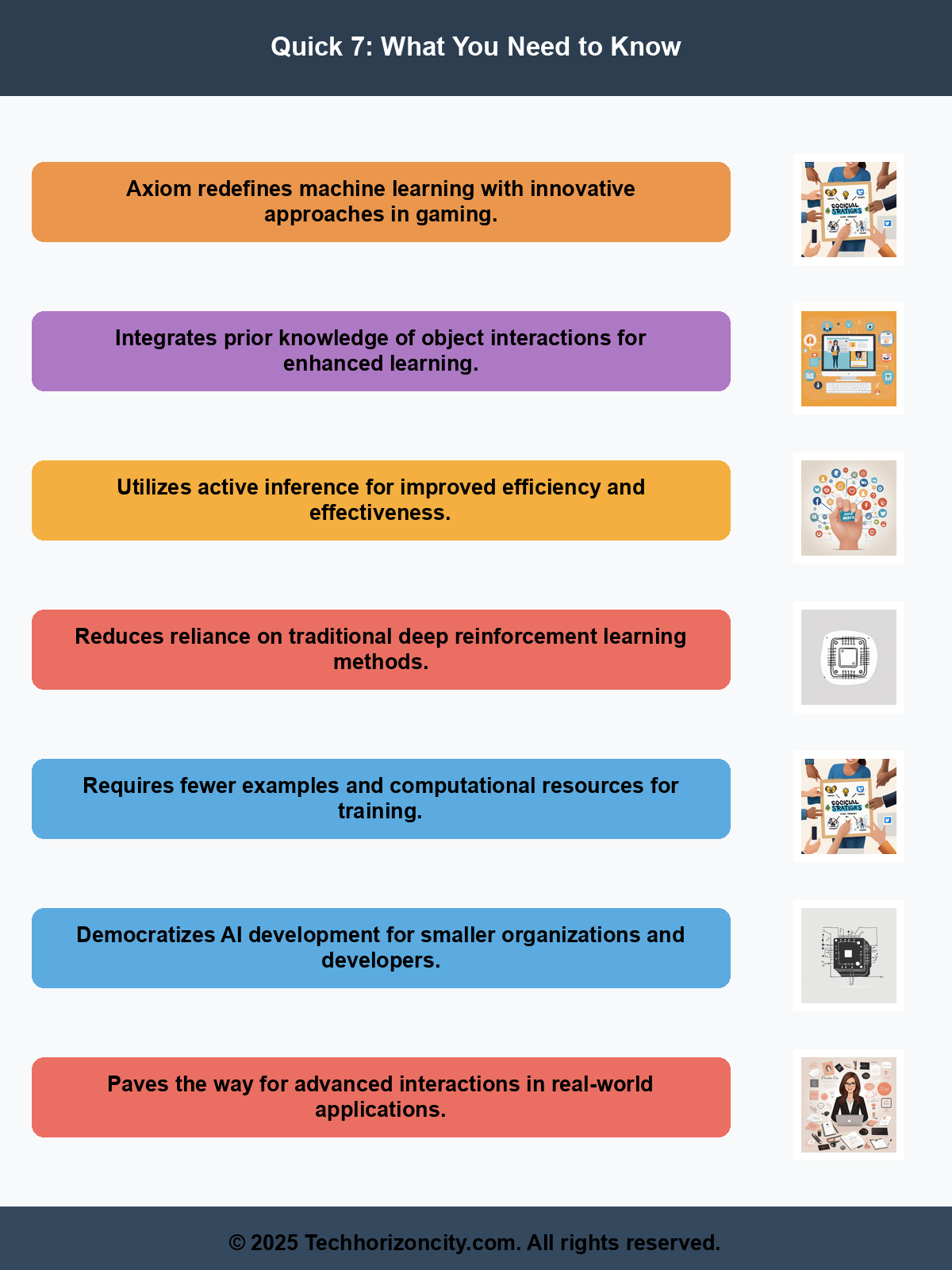Executive Summary
The evolution of artificial intelligence is witnessing a significant turning point with the introduction of Axiom, a novel machine learning system developed by Verse AI. Unlike traditional artificial neural networks, Axiom embraces a revolutionary approach by integrating prior knowledge of object interactions, particularly in the realm of video games. This article delves into the distinct features of Axiom, its innovative algorithm based on active inference, and the broader implications of this technology for artificial general intelligence (AGI) and the future of machine learning in various industries.

Background Context
The landscape of artificial intelligence has been primarily dominated by deep learning techniques, which have made substantial strides in various fields, from natural language processing to computer vision. The success of deep learning is largely attributed to its ability to process vast amounts of data and learn from it, enabling breakthroughs in speech recognition, facial recognition, and even artistic endeavors such as image generation. However, reliance on conventional deep reinforcement learning methods has highlighted certain limitations, particularly concerning the efficiency of learning and the computational power required.
In response to these challenges, Verse AI has unveiled Axiom—a machine learning system that seeks to transcend the constraints of traditional models. By incorporating insights from the free energy principle, a theoretical framework proposed by neuroscientist Karl Friston, Axiom aims to provide a more efficient and effective learning process. This principle posits that systems seek to minimize surprise and uncertainty, a concept that Axiom harnesses to model game responses more intuitively.
Analysis of Implications
The implications of Axiom extend beyond mere performance improvements in gaming environments. By utilizing a model that demands fewer examples and lower computational resources compared to its predecessors, Axiom represents a paradigm shift in how we conceive machine learning applications. This efficiency could democratize AI development, making sophisticated systems more accessible to smaller organizations and independent developers who may lack the vast resources typically required for deep learning projects.
Additionally, as François Chollet, a prominent voice in the AI community, suggests, the exploration of new ideas is crucial for the advancement of artificial intelligence. Axiom not only serves as a testament to the potential of innovative thinking but also emphasizes the need for diverse approaches to problem-solving within the field. Its capacity to master simplified video games—such as driving, bouncing, hunting, and jumping—demonstrates a leap forward in how AI can interact with dynamic environments, suggesting a pathway towards more complex and nuanced interactions in real-world scenarios.
Industry Impact Assessment
The introduction of Axiom could herald a new era for various sectors that leverage AI technologies. The efficiency and adaptability of this system may find applications extending beyond gaming. For instance, industries such as robotics, autonomous vehicles, and even healthcare could benefit significantly from a machine learning approach that requires less data and computational power while still achieving high levels of performance. These advancements could accelerate the development of intelligent systems capable of real-time learning and adaptation, thereby transforming the operational landscape across multiple fields.
Moreover, the potential of Axiom to contribute to the quest for artificial general intelligence (AGI) is particularly noteworthy. AGI represents the Holy Grail of AI research, where machines possess the capacity to understand, learn, and apply knowledge across a wide array of tasks, much like a human. If Axiom’s principles can be scaled and adapted to more complex tasks and environments, we may be moving closer to realizing AGI, fundamentally altering our relationship with technology and its role in society.
Future Outlook
As we look ahead, the trajectory of Axiom and its underlying principles suggests a promising future for machine learning. The industry may witness a shift towards more adaptable and efficient AI systems that prioritize learning from fewer examples, leading to faster innovation cycles and reduced barriers to entry for new players in the space. The technology could inspire further research into hybrid models that integrate various learning paradigms, ultimately enriching the field of artificial intelligence.
Additionally, ethical considerations surrounding AI development will become increasingly paramount. As systems like Axiom pave the way for more intelligent machines, the discourse around responsible AI usage, transparency, and accountability will need to evolve. Stakeholders across industries must collaborate to ensure that the advancements in AI contribute positively to society while mitigating potential risks.
Conclusion with Key Takeaways
Axiom emerges as a groundbreaking machine learning system that challenges traditional methodologies and paves the way for more efficient, intelligent applications. By harnessing prior knowledge and employing algorithms inspired by neuroscience, Axiom not only enhances performance in gaming environments but also holds significant promise for broader applications in various industries.
In summary, the key takeaways from the rise of Axiom include:
- A shift towards more efficient machine learning systems that require less data and computational power.
- Potential contributions to the pursuit of artificial general intelligence.
- The importance of exploring diverse approaches to AI development for continued innovation.
- The necessity for ethical considerations as AI technologies advance.
As we stand on the cusp of what could be a transformative era in AI, Axiom serves as a beacon of what is possible when creativity and scientific principles converge to redefine the boundaries of machine learning.
Disclaimer: This article was independently created based on publicly available information and industry analysis. While inspired by developments reported at www.wired.com, all content, analysis, and opinions expressed are original and do not reproduce copyrighted material.
For the original reporting, please visit: https://www.wired.com/story/a-deep-learning-alternative-can-help-ai-agents-gameplay-the-real-world/
